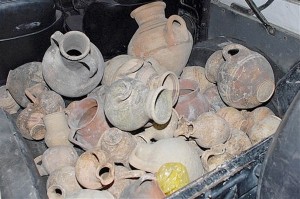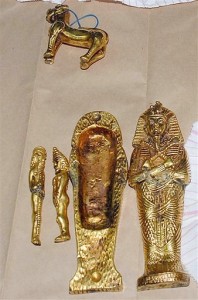 Cyprus police raided a huge antiquities smuggling ring in southern city of Limassol that was set to sell dozen of antiquities worth an estimated $15.5 million. This is the biggest antiquities smuggling bust in Cyprus history.
Cyprus police raided a huge antiquities smuggling ring in southern city of Limassol that was set to sell dozen of antiquities worth an estimated $15.5 million. This is the biggest antiquities smuggling bust in Cyprus history.
Artifacts include urns, gold figurines and coins, some thought to be as much as 4000 years old. They were found in various homes, backyard sheds and vehicles belonging to the suspects, some in scarily casual arrangements.
The Cypriot police were alerted to the ring when one of its alleged members tried to sell some treasure to a man who ended up being an undercover Greek policeman. The Greek police then contacted the Cyprus authorities.
Ten Cypriots were arrested during the raids over the weekend, and authorities were searching for another five suspects, including a Syrian man, police spokesman Michalis Katsounotos said. The suspects face charges of illegally possessing and trading in antiquities.
Police said the smugglers had planned to sell the artifacts in Cyprus, but would not identify the buyer. Authorities also said they were investigating where the artifacts had been obtained.
Katsounotos said this was Cyprus’ largest antiquities smuggling case in terms of the amount of recovered artifacts, their archaeological value and the number of arrests.
Most of the artifacts are urns primarily found around the southern coastal towns of Limassol and Paphos, Hadjicosti said. Some of the coins could date to Hellenistic and Roman times.
 Some of the most valuable artifacts are a miniature gold coffin and gold figurines. These don’t appear to be Cypriot in origin. The wee coffin looks like an Egyptian sarcophagus.
Some of the most valuable artifacts are a miniature gold coffin and gold figurines. These don’t appear to be Cypriot in origin. The wee coffin looks like an Egyptian sarcophagus.
Other artifacts may have been looted from the Turkish north of Cyprus. (The spokesman wasn’t terribly forthcoming on that subject. Don’t think it’s a coincidence that the Cypriot police made a big deal out of the cooperation of the Greek police.)
Unfortunately, antiquities smugglers and art thieves aren’t curators. As far as they’re concerned, even a partial haul will still net them hundreds of thousands, so who cares if a few clay pots get broken?
The same thing happened when Martin Cahill, the infamous Irish mob boss, pulled off a heist of several famous artworks in Russborough House and then just left the paintings outside. They were covered up against the rain, but other than that there was no effort to make sure that damp didn’t seep in, which it did and left several of the paintings completely encrusted with a white mess where the moisture had reacted with the surface of the paintings. :no:
Ugh. I shudder at the thought of paintings in the rain. Looting is so contemptuous of the wealth it seeks to exploit. The tomabaroli who looted the Sarpedon krater from Cervetri apparently found it fairly whole and actually took a hammer to it shattering it so it would be easier to smuggle out of the country. It makes me physically ill.
The Greek Cypriot communications minister was keen to suggest that some of the stuff had come from the Turkish Cypriot, northern region; but the archaeologist reckoned most of it came from the Greek Cypriot, southern region.
Given the smugglers were Greek Cypriot (and Syrian), the dealer was Greek, and the collectors were (probably) Greek Cypriot, I don’t actually think the communications minister did the Republic of Cyprus any favours by trying to focus attention on the looting of northern Cyprus.
All it does is demonstrate how Greek Cypriot antiquities collecting is the driving force and funding source for the looting of the area under Turkish Cypriot administration, as well as the area under Greek Cypriot control.
I was hoping you’d swing by to comment. You’re the Cyprus master. Thank you for expanding. :thanks:
Most illegally obtained Cypriot antiquities now come from the Turkish north – there are simply more items there that are not yet in “stable” hands. Is much of the business end of this smuggling done in the Greek south? Yes (although points east tend to germinate the plots), because there’s more money, business, and infrastructure there. This is not, as they say, “rocket science”, nor is it shocking to anyone involved in Aegean antiquities or law enforcement.
You’re the Cyprus master. Thank you for expanding.
Livius Drusus:
Oo, only just seen your reply. :blush:
Incidentally, is there any way to follow individual posts(‘ comments)?
(The(?)) TCN:
I would be delighted if you could provide me with evidence-based numbers of antiquities looted from the north and the south. I do agree that it’s reasonable to assume that more stuff is getting looted from the north; but we must remember that it is an assumption.
I think you’re also ignoring the other reason for the southern market driving the looting of the north: religious nationalism. The Greek Cypriots are not so keen to loot the area under their control, because it is under their control; but they are very keen to “rescue” Greek (Cypriot) and/or Christian antiquities from the area under Turkish Cypriot/Muslim control.
(Even that’s ignoring the far more complicated history of antiquities collecting.)
Notably, there is obviously a lot of money, infrastructure, etc., elsewhere in the west; but Cypriot antiquities don’t sell that well elsewhere; and when they do, it seems to be primarily to Greek Cypriots living abroad.
So, the Cypriot trade is a special case; religious nationalism is important. That situation is different from, for example, the Greek antiquities market (which has a mass of secular, non-Greek buyers); and that might be surprising to some.
It should certainly be interesting to some, because it suggests that Greek Cypriots do have the power to massively reduce the looting of the north. They could stop paying for it.
I should hope Aegean law enforcement is not surprised by the business being done in the south, since it is one of the buyers doing business there.
Generally:
It’s weird to get interest in this (and my blog) now. Have I missed another case in the news this week…? :confused:
shorely the places need curaters to gaurd history like ireland example
Its a real shame to here people are targeting the antiquities and the heritage of Cyprus for their own personal gains. Assets such as these are for the people of Cyprus.
This was an old article so lets hope this kind of activity has stopped and is controlled by Cyprus.
Holidaymakers come from far afield to see the treasures of the ancient times, and Cyprus has very much a rich history to offer.